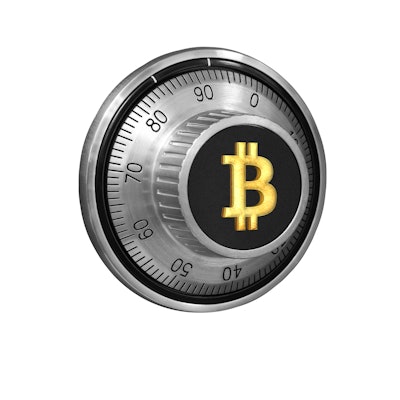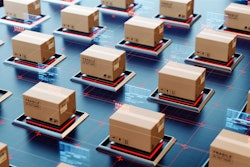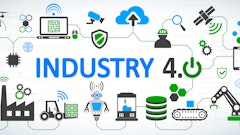Headlines about blockchain promise grand things. No problem is unsolvable with this incredible new technology—or so the headlines seem to indicate. While the excitement over blockchain has surely led to overblown predictions and expectations, the potential for it to be a disrupter in a positive way is already being realized. These days there are many blockchain pilots going on and investments in blockchain, start-ups are reaching into the millions. One question that these pilots hope to answer is what is the next stage for this emerging technology, and how will it impact the supply chain?
While blockchain in its simplest form is an open ledger that can be used to track and trace transactions, the powerful technology needs to be more if it will fulfill some of the expectations that have been placed upon it. Like many new technologies, it needs to find a solution. Sam Radocchia, co-founder and chief marketing officer for Chronicled, which leverages blockchain and Internet of Things technologies to deliver smart supply chain solutions, says “what blockchain is going through is typical for new technology products in that the pilots are studying where it is more applicable and scalable.”
But according to Ken Cottrill, co-founder and research principal of Chain Business Insights LLC, a company which conducts and publishes research on the intersection between blockchain and the supply chain, blockchain is getting to the point where it needs to deliver. “There was hype regarding blockchain suggesting that it could be a panacea for solving all supply chain problems,” he says. “It’s now moving into a phase where it might address some specific problems. The challenge going forward is that it has to start delivering value to overcome the skepticism some feel.”
Headlines about blockchain promise grand things. No problem is unsolvable with this incredible new technology—or so the headlines seem to indicate. While the excitement over blockchain has surely led to overblown predictions and expectations, the potential for it to be a disrupter in a positive way is already being realized. These days there are many blockchain pilots going on and investments in blockchain, start-ups are reaching into the millions. One question that these pilots hope to answer is what is the next stage for this emerging technology, and how will it impact the supply chain?
Growing Pains
While blockchain in its simplest form is an open ledger that can be used to track and trace transactions, the powerful technology needs to be more if it will fulfill some of the expectations that have been placed upon it. Like many new technologies, it needs to find a solution. Sam Radocchia, co-founder and chief marketing officer for Chronicled, which leverages blockchain and Internet of Things technologies to deliver smart supply chain solutions, says “what blockchain is going through is typical for new technology products in that the pilots are studying where it is more applicable and scalable.”
But according to Ken Cottrill, co-founder and research principal of Chain Business Insights LLC, a company which conducts and publishes research on the intersection between blockchain and the supply chain, blockchain is getting to the point where it needs to deliver. “There was hype regarding blockchain suggesting that it could be a panacea for solving all supply chain problems,” he says. “It’s now moving into a phase where it might address some specific problems. The challenge going forward is that it has to start delivering value to overcome the skepticism some feel.”
The multitude of pilots occurring offer promise, yet some are also drawing skepticism. Some of the new pilots are being spawned by companies that are part of large corporations. However, there’s an issue being overlooked according to Geoff Annesley, executive vice president of One Network, a cloud provider of enterprise applications and a platform for multiparty business networks for a host of industries.
“The problem with some of the blockchain pilots is that blockchain does not work with a party of one, and multiple blockchain networks need to be used to solve sophisticated enterprise problems. You need many parties participating on the network to deliver value. And developers are discovering that there is a lack of basic software services, such as multiparty workflows and community or multiparty master data, that need to be custom developed to enable useful enterprise solutions to leverage blockchain networks.”
Benefit of Scale
There are 1,000 or so blockchains currently developed and more pilots looking to increase that number. Most blockchains are specialized in terms of capabilities, from more and less complex. No one blockchain is a one-size-solves-all enterprise solution because they run differently and on different speed, cost and scale. Companies may ultimately need to embrace multiple blockchains in order to be successful.
The promise of blockchain extends to companies of all sizes. In fact, Annesley believes blockchain will help smaller companies participate in networks previously closed to them due to a lack of IT capabilities and B2B resources. “Many middlemen, including online cloud services, will become irrelevant, leading to greater cost, time and speed efficiencies,” he says. “And transparency will lead to better accountability and traceability, and ultimately, enable trusted transactions between any party on the network.”
Blockchain will reduce the friction of working with each other as a single version of truth and eliminate the need for reconciliation, speeding up multiparty B2B2C processes. “This will increase efficiency, reduce payment delays, and allow smaller companies to provide services to larger companies that might otherwise not be able to engage due to cash flow, IT capability and trust issues,” says Annesley.
He adds that blockchain is set to impact supply chain networks dramatically. “With today’s siloed, company-centric ERP systems (including cloud ERP), there are gaps in tracking, duplicated information, messy reconciliation processes, as well as room for fraud, overbilling, counterfeit leakage into the supply chain and the like. There is a lot of room to improve here.”
Track and Trace
Many industries are in a position to benefit from blockchain. That impact, however, has yet to be felt in a significant way. However, in the near future (one to two years), Cottrill says “blockchain could streamline supply chains by making them easier to track the flow of product and improve visibility.”
One of the current blockchain pilots involves IBM and Walmart. They aim to track the global food supply. Part of the pilot involved tracing a package of mangoes to know where it was grown and monitor every movement it experienced along the supply chain. This would normally take several weeks but with blockchain it took several seconds. If this can be implemented on a wide scale, fruits and vegetables and all foods could be tracked from grower to retailer.
What’s the point of tracking the movement of food, some may wonder? Cottrill gives a practical example. When bacteria appear in the food chain, it’s hard to identify where it penetrated the supply chain. If a product needs to be recalled, it can be difficult to pinpoint exactly where the infected product originated. This means all related products would have to be removed from store shelves leading to waste. It also would take longer to replace the product.
Ridding the shelves of good product and extra time replacing it hurts the retailer’s bottom line. “With blockchain, each event is recorded, and every authorized party is automatically notified. This record could be consulted to pinpoint where things went wrong,” says Cottrill. In addition to money savings, blockchain could make companies less vulnerable to fraud and reputational risk.
Trust Is Critical
There are challenges in putting such a blockchain into practice, though. A system would have to be created to track the items. This would add a cost. For smaller companies and growers, the cost could be prohibitive. How could they be brought into the system? Some have suggested subsidies or grants as a way to get all parties involved. In addition, the data would have to be entered into the system accurately. And once again, there’s trust. It all seems to come back to trust when talking about blockchain.
For blockchain to really take off, resolving the issue of trust is imperative. Any party in the blockchain can see information from other parties, and some may be leery of sharing that data. Radocchia of Chronicled notes this is a serious concern. “Privacy is a big challenge with some blockchain implementations, as the risk of revealing sensitive information or competitive business intelligence is high,” he says. “By incorporating privacy into the architecture of the network, it allows participants to feel comfortable on the same network.”
While the pilots are sure to reveal interesting findings, companies might not want to wait for their completion. Cottrill suggests companies, “start building internal knowledge on what blockchain is, what it could do, and determine if it is really what the company wants to use.”




















